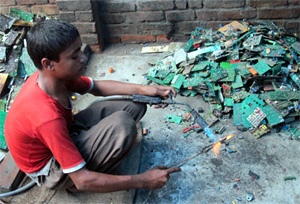 FEATURE FEATURE
|
Moradabad: Brass Work has turned into E-waste Recycling
Vinod Kumar Sharma
Source: Toxics Link, Date: , 2011
Moradabad a western city in Uttar Pradesh is situated at the bank of Ram Ganga River. It is 170 Km away from Delhi and well connected via road  & railway to the other parts of India. The city has been traditionally famous for bangle and brass works and is known as ‘Peetal Nagri’ or the Brass city. It has the distinction of being the biggest exporter of brassware in the country. But shrinking of brass market due to decreasing demand, nationally and internationally, has left many people jobless here in the last few years. Many households, which were engaged in brass works earlier, were left with no choices but to explore other means of livelihood. E-waste was one of the natural choices because of their metal processing knowledge. E-waste is one of fastest growing waste stream globally. E-waste contains ferrous & non-ferrous metals, plastic, glass, printed circuit boards (PCBs), etc, and are ‘hazardous’ because of the presence of elements like lead, mercury, arsenic, chromium, cadmium, barium, flame-retardants etc. E-waste also contains precious metals and many rare materials like gold, silver etc., which are highly valuable. Currently, most e-waste recycling activities in India are done by the unorganized sectors. Some of the processes involve burning or direct heating, use of acid baths, mercury amalgamation and other chemical processes to recover materials. These result in the release of toxics such as heavy metals, hydrocarbons, dioxin & furan etc. into the environment through emissions or effluents. Most workers engaged in these recycling operations are the urban poor and unaware of the hazards associated with it. The recycling operation especially the process of material recovery being rudimentary, results in very low recovery of materials and non-recovery of many rare elements. This loss is significant, making the whole process highly inefficient. E-waste recycling in India, till a few years back, was concentrated in large cities like Delhi, Mumbai, Bangalore, Chennai and Kolkata. But with the increase in the generation of E-waste and increasing land costs in big cities, the recycling centres have started spreading in neighboring cities and towns. Moradabad is one such example. Recyclers in Moradabad buy PCB boards from Delhi, Kolkata, Chennai, Banglore and other parts of India. The circuit boards are sourced from computer monitors, CPUs, keyboards, television, remote control sets, radios, CD/DVD players, cell phones, compact fluorescent lamps (CFLs) and other electrical appliances. According to some estimations, 50% of the printed circuit boards used in appliances in India end up in Moradabad. They process it to recover metals such as copper, aluminum, gold and silver. Some of the recycling hubs in Moradabad are Warsi Nagar, Nawabpura, Karula and Bhojpur village. The boards are initially heated on gas stove or through blowtorch to loosen the lead soldering. The attached capacitors, ICs, diodes, resistors etc are then removed through a hammer and segregated. The working parts are sold to traders for reuse. The non-working components are further processed (grinding or burning) for recovery of materials. Poor people for recovery of metals through washing buy ash and dust, from the grinding processes. Some areas in Moradabad are also famous for gold and silver recovery from E-waste, through the cyanide and mercury process. The recyclers buy the gold plated board at Rs.170-190/Kg; 1 Kg gold plated boards give around 200 mg gold. The people, who recover the costly metal gold & silver, sell it to the big jewelers. The jewelers give loan to these recyclers on higher interest and buy the gold & silver on the low rate less than the market. E-waste recycling is a home business in Moradabad, with most members in a family involved in material recovery the workers employed earn around Rs.100-150/ per day. The processes are rudimentary and very risky. As the working spaces are very congested, the workers are exposed to noise, smell and fumes, sometime very toxic and harmful to health. Though there have been no studies to understand it, the emissions, effluent discharges and dumping of non-recyclables clearly indicate huge damage to environment. Emergence of a small city like Moradabad as an E-waste recycling hub points out towards intensity of the E-waste problem India is facing today. It is important to look at the reasons and find solutions; otherwise we will soon end up with toxic hotspots all over the country. |
|


 & railway to the other parts of India. The city has been traditionally famous for bangle and brass works and is known as ‘Peetal Nagri’ or the Brass city. It has the distinction of being the biggest exporter of brassware in the country. But shrinking of brass market due to decreasing demand, nationally and internationally, has left many people jobless here in the last few years. Many households, which were engaged in brass works earlier, were left with no choices but to explore other means of livelihood. E-waste was one of the natural choices because of their metal processing knowledge.
& railway to the other parts of India. The city has been traditionally famous for bangle and brass works and is known as ‘Peetal Nagri’ or the Brass city. It has the distinction of being the biggest exporter of brassware in the country. But shrinking of brass market due to decreasing demand, nationally and internationally, has left many people jobless here in the last few years. Many households, which were engaged in brass works earlier, were left with no choices but to explore other means of livelihood. E-waste was one of the natural choices because of their metal processing knowledge.